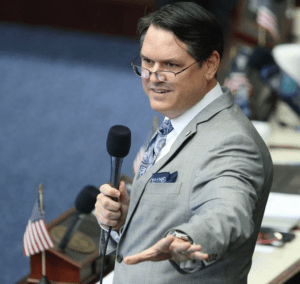By John Haughey
The Center Square
February 29, 2020

With two weeks remaining in Florida’s legislative session, a House E-Verify bill has finally emerged with a committee adoption of a measure that exempts existing private businesses.
The House Commerce Committee approved House Bill 1265, sponsored by Rep. Cord Byrd, R-Neptune Beach, in a partisan 16-8 vote, securing its first hearing endorsement.
The measure, passed in committee Thursday, will need to sprint through the House Appropriations and State Affairs committees to get to the House floor before the session ends March 13.
A Senate E-Verify bill, Senate Bill 664, has one hearing in the Senate Rules Committee on Monday and could be presented on the chamber’s floor next week.
That measure, however, faces uncertainty after sponsor, Sen. Tom Lee, R-Thonotosassa, submitted amendments that “pretty much gut the bill” and called on Gov. Ron DeSantis to veto it if adopted as is.
Adopting E-Verify is among priorities spearheaded by DeSantis and state Republican chairman Sen. Joe Gruters, R-Sarasota, in tandem with President Donald Trump’s crackdown on undocumented immigrants.
Mandatory E-Verify, however, is vigorously opposed by Republican-aligned interests, including the Florida Chamber of Commerce, the Florida Fruit & Vegetable Association (FFVA), tourism, industry and retail interests.
Despite all House Commerce Committee Republicans approving the measure, it remains a divisive issue within the GOP-controlled Legislature, a schism illustrated Thursday when the Immigration Partnership & Coalition (IMPAC) Fund released an open letter opposing the E-Verify bills addressed to DeSantis and legislators and signed by leaders from diverse industries across the state, including Cuban American entrepreneur Mike Fernández, the nation’s largest tomato grower Paul DiMare and former CEO of Carnival Cruise Line Bob Dickinson.
Those internecine-GOP divides surfaced in amendments – and amendments to those amendments – to Lee’s SB 664, which exempted and then un-exempted agricultural operations, and in the delayed introduction of Byrd’s HB 1265.
SB 664 would allow employers to use a process “substantially equivalent” to E-Verify and to certify under the penalty of perjury they are not hiring undocumented immigrants.
Lee and Gruters have vowed to push for a bill that requires all state employers use E-Verify.
HB 1265 would require all public employers – state agencies, school districts, municipalities – and their contractors to use E-Verify while exempting most private businesses.
Under the bill, private employers using the I-9 verification system, which is used by the federal government to determine employment eligibility, can continue doing so in lieu of E-Verify. New businesses would be required to use E-Verify.
“This really mirrors what federal law is doing,” Byrd said.
“If a person is misidentified, how long does it take for them to gain employment again?” asked Rep. Javier Fernandez, D-South Miami, referring to a report that said the database has a 12 percent error rate.
Rep. Evan Jenne, D-Dania Beach, cited a study that said the bill’s requirements would cost a business with 10 employees $1,200 a year.
“Every time I have spoken to my communities about putting in place more obstacles for folks to work and more obstacles for the economy, I always learn how that harms the economy here in Florida,” Rep. Al Jacquet, D-Riviera Beach, said.
E-Verify would help, not hurt, American workers, insisted Rep. Anthony Sabatini, R-Howey-in-the-Hills.
“Working Floridians will benefit from this bill. This actually will help boost wages,” he said. “It will improve the health of the economy for the working Floridians.”
Rep. Heather Fitzenhagen, R-Fort Myers, said E-Verify also would protect undocumented workers from being exploited and be useful in combating human trafficking and sex trafficking.
“People are lured to this state under the guise of getting a job and then subjected to unconscionable abuse,” Byrd said. “Forced labor equates to modern day slavery.”
